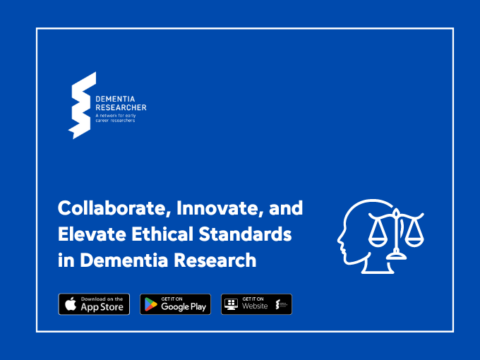 By now you will already know that Dementia Researcher is developing a new Communities App to expand support for early career researchers – delivering new ways to come together and new training events to support careers.
By now you will already know that Dementia Researcher is developing a new Communities App to expand support for early career researchers – delivering new ways to come together and new training events to support careers.
We are thrilled to unveil that our Communities App will also deliver a yet another pioneering new feature designed specifically for the dementia research community: our Online Virtual Journal Clubs. This innovative tool embedded with our communities app is tailor-made for researchers and clinicians, working in all areas of dementia research discovery – from care research to biomarkers, fundamental science to clinical services.
Why a Virtual Journal Club?
Journal clubs have long been a cornerstone of academic and medical education, providing a structured setting for discussing new research, critiquing methodologies, and fostering a community of learning and inquiry. In the field of dementia research, where advancements and discoveries are both rapid and crucial, staying up-to-date and connected is more important than ever.
However, the traditional model of journal clubs can often be restrictive, limited by geographical and scheduling constraints. Our new platform transcends these barriers, offering a flexible and accessible online environment where ECRs from around the world can connect, share, and collaborate without the need to travel.
A features of our platform
Our platform offers a range of features designed to maximize interaction and engagement:
- Live Discussion Sessions: Host live video sessions with the ability to present research papers, share screens, and engage in real-time discussion.
- Flexible Scheduling: Arrange meetings at times that suit you and your participants, across time zones.
- Interactive Tools: Utilise tools such as polls, Q&A sessions, and online chat to enhance communication, continue the discussion after the live session and decide on what papers you’ll discuss.
- Archive Access: Record sessions for later viewing, allowing members who could not attend to catch up and stay informed.
- Unlimited Groups: Our platform will allow hundred of groups, but each will have a limit of 16 people (but you can have multiple groups for the same niche / research field)
Call for Hosts
We are currently seeking forward-thinking researchers who are interested in hosting their own journal club. Whether you’re looking to start a general dementia research journal club or focus on specific subfields like Neuroinflammation, Apathy, Blood Biomarkers or care practices, this platform can cater to your needs.
Hosting a session is an excellent opportunity to foster dialogue on topics you are passionate about, enhance your professional reputation, find new collaborators and contribute to the global dementia research community.
Join Us
If you are a researcher in the field of dementia, and you are interested in hosting or participating in a virtual journal club, we would love to hear from you.
Let us know you’re interested
Thank you to those who have already applied to co-ordinate a virtual journal club. If you would like to be involved with any of the following groups email us at dementiaresearcher@ucl.ac.uk
- Dementia prevention
- Dementia epidemiology in low-resource settings
- Dementia and technology
- Dementia and occupational therapy advances
- Technology in care homes
- Qualitative Dementia Research
- Advances in Lewy body diseases
- Computational Dementi
Why should I do this?
1. Enhanced Understanding of the Field
Engaging deeply with current research through journal clubs helps PhD students and ECRs solidify their understanding of the latest developments and debates in dementia research. This active engagement with literature can also spark new ideas for your own research and potentially highlight areas that are prime for further investigation.
2. Networking Opportunities
By hosting a journal club, ECRs can connect with peers and established academics alike, inside and outside your own organisation. These interactions can lead to collaborations, mentorship opportunities, and even future career prospects. Networking in such a focused setting helps build a professional identity and can make a significant impact on your career.
3. Skill Development
Cordinating a group and taking turns to host sessions, help you develop crucial skills beyond those typically gained through regular research activities. These include public speaking, critical thinking, and the ability to facilitate discussions. Additionally, the process of organising a journal club can enhance project management and leadership skills.
4. Visibility in the Academic Community
Taking the initiative to host a journal club can significantly raise a researcher’s profile within the academic community. It demonstrates a commitment to the field, the ability to engage with complex material, and leadership in bringing the community together. This visibility can be particularly beneficial when applying for grants, postdoctoral positions, or academic roles (and it is great for your narrative CV).
5. Feedback on Own Work
PhD students and ECRs can use these sessions to present their own work and receive feedback in a relatively low-pressure environment compared to international conferences or seminars. This feedback can be invaluable for refining their research and preparing for formal presentations.
6. Facilitation of Collaborative Research
Journal clubs often lead to discussions that can spark collaborative research projects. By hosting / co-ordinating you position yourself at the center of such collaborations, potentially leading projects or becoming a key contributor.
7. Professional Development
Participating in and hosting journal clubs are activities that can be highlighted in CVs and professional development records. They are viewed favourably by academic committees and potential employers within academia and beyond, showcasing the individual’s proactive engagement with their scientific community.
Together, we can build a more connected and informed community that is empowered to face the challenges of dementia with collective knowledge and collaborative spirit.

 Print This Post
Print This Post




I am a trans/nonbinary person living with dementia. I sure I don’t have to tell you how very scarce resources and support are for queer folk with dementia. I hope your new initiative can change all that and bring together the enormous pool of talented researchers able to make real change in health equity and inclusion around dementia care.